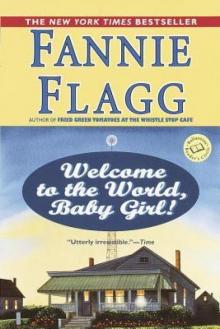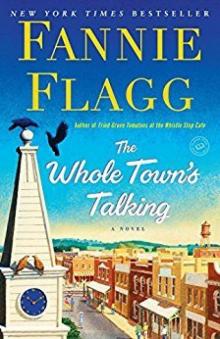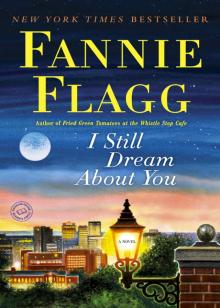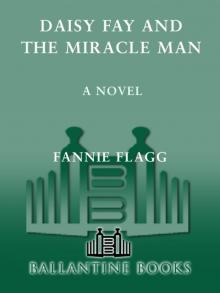- Home
- Fannie Flagg
The Whole Town's Talking Page 2
The Whole Town's Talking Read online
Page 2
I HAVE A HOUSE AND COWS.
—LORDOR NORDSTROM
SWEDE TOWN, MISSOURI
1889
* * *
CHICAGO
Katrina Olsen, only five years from Sweden, was a domestic servant in a large household in Chicago. She had been helping clean the kitchen that morning and had noticed Lordor’s ad in a newspaper. She carefully tore it out and put it in her apron pocket. That night, when she and her friend and coworker Anna Lee were upstairs in their room, Katrina showed her the ad.
“Do you think I should answer it?”
Anna Lee looked at the ad with some alarm. “Oh, Katrina…Missouri? We don’t even know where that is. There could be wild Indians or bears even. And this Lordor Nordstrom might be mean and ugly.”
Katrina sighed. “I know, but I don’t want to be a servant all my life.”
“No, me either, but I don’t see much difference in being a servant and being some old cow-farmer’s wife. Besides, it’s too much hard work with no pay. No, I’d rather stay in the city and take my chances with the boys here.”
Being a pretty girl, Katrina had gone out with a few Chicago boys, friends of Anna Lee’s, but they’d been too slick and fast-talking for her taste. And, somehow, the idea of working hard on your own land did not seem that daunting to her. But what Anna Lee had said about bears and wild Indians was a real concern. When they had been learning English, they had read all the popular American dime novels, like Trapper Bess and Mountain Kate, that told of all the many perils women faced living out in the wilderness.
But the more Katrina thought about the ad, the more it intrigued her. She knew going all the way to Missouri would be a risky venture. She could be eaten by a mountain lion or worse. But the ad said the man had a house. When she had left Sweden, she had made certain promises, and she desperately wanted to keep them. So it might be worth taking a chance, but she had waited so long to respond, she was sure Mr. Nordstrom had found someone by now. Still, she guessed it couldn’t hurt to write and see.
Dear Sir,
A 24-year-old Swedish lady of the Lutheran faith with skills of cooking, sewing, and gardening and a good nature is answering your advertisement. Enclosed is my photograph. If you are so inclined and not already taken, please send your photograph.
Sincerely,
Katrina Olsen
It had been weeks, and Lordor Nordstrom had not yet received one reply to his ad. A lot of girls had seen the ad, but most Swedish girls in Chicago were like Anna Lee. They had left farms in Sweden and had no desire to go back to one. Lordor had almost given up hope when Miss Olsen’s reply arrived.
The day the letter arrived, Lordor brought Miss Olsen’s photograph over to the women as promised. They had all gathered in Mrs. Knott’s kitchen for the occasion. After Lordor handed it over, he was told to wait outside so they could speak freely.
Lordor wandered out to the barn and had a smoke with Mr. Knott, who had also been banned from the kitchen. He had no more than finished his smoke when the kitchen door flew open and Mrs. Knott called out, “Lordor, come on in….Henry, you stay out there. I’ll get your lunch in a minute.” Mr. Knott nodded. He hoped it would be sausage and potatoes today. His wife wasn’t much to look at, but oh, her steaming sauerkraut, her Wiener schnitzel, her piping-hot pot roast, creamed noodles, and apple dumplings.
Lordor walked slowly up the stairs to receive his verdict. He took his hat off, stepped inside, and was told to have a seat while five ladies stared at him. He suddenly felt himself start to sweat under the pressure when Birdie Swensen, the gentlest of the five women, spoke.
“Now, Lordor…a girl can be pretty and fool a man, but she can’t fool another woman. Yes, this girl is pretty, but for a wife, you want someone of good character as well.”
Lordor cleared his throat. “Yes, I suppose so.”
“Trust us, you do. And so, after careful study, we all agree. This girl has character.” They all nodded as she continued. “We think you need to answer her letter right now, before somebody else grabs her.”
Mrs. Lindquist jumped in. “Besides, she’s a Lutheran, Lordor. What else do you need to know?”
Lordor was awfully glad to hear the ladies’ opinion. He cared very much about what they thought, but in this case, he hadn’t needed much prompting. The moment he had seen the girl’s photograph, he had been smitten. She was Swedish all right, with her blond braids arranged so neatly across her head and wearing her high-necked white lace blouse with a cameo. And she was very pretty. But it was something else that had captured his attention right away. It was a look in her eye that certain immigrants recognized in one another. A look of hope and determination, almost as if she was gazing past him, far into the future. The day the photograph had arrived, he’d stared at it for so long that when he closed his eyes that night, he could still see her face. He figured that must mean something, but he stopped himself from going too far. First, he needed to have his picture taken and give the girl a chance to get a good look at him.
Oh, Lord. Just the thought of her seeing his photograph filled him with dread. Now he knew how that poor horse he’d just bought must have felt when he had examined every inch of him and looked at all of his teeth before putting his money down. Tomorrow, he was going to give that horse some extra hay as a way of an apology.
November 1865
* * *
VIKEN, SWEDEN
The baby had come much too early. A woman named Ingrid Olsen had just given birth beside a lake next to the potato field where she worked. She guessed, by the weight of the potatoes, that the baby girl weighed no more than five pounds. A friend helped Ingrid wrap her up in a torn burlap sack.
Ingrid had already lost two babies, but if by some miracle this baby should live, she would name her Katrina. She knew that winter was coming. And with so little food and a house with such poor heat, she did not hold out much hope.
Ingrid looked down at the squirming little five pounds of blue-eyed life she held in her arms and cried for the child’s future.
—
IN 1865, SWEDEN WAS A LAND with strict class divisions, with no middle ground. If you did not own land, you worked it for the ones who did, with no hope for a different future for you or your children.
But something had happened. Something called America. And there was now hope in the world. A place where if you worked hard, you had at least a chance for something better. But at that moment, Ingrid’s baby girl was only forty-two minutes old and already hungry.
Katrina had lived, but she had been frail and sickly all her life. When she was seven, she contracted measles that settled in her eyes and caused her to go temporarily blind. Gradually, over the next few years, her eyesight slowly came back, but it was never good after that. When her father died, Katrina had stayed home to tend to her younger brother and sister as her mother continued to work in the fields.
As Katrina got older, she was able to help with the cooking and the baking. Before she married, her mother had worked in the city as a pastry cook for a wealthy family. But that was before she had fallen in love with a tenant farmer.
Luckily, Ingrid still baked with a light touch. And later, when she could no longer work in the potato fields, she was able to sell her pastries to the family who owned the farm for special occasions. But there was never enough money. Many nights, they went to bed hungry. Their only hope of survival was one of them somehow getting to America and finding work. They all thought it would be Katrina’s brother, Olaf, who would go, but Olaf was still too young. Katrina had not wanted to leave home, but she felt she had no choice.
The day she left, Katrina tried not to cry. She wanted to be strong for her mother. They walked to the nearest town and stood waiting for the wagon that would take Katrina to catch a train to Bremen, Germany, where she could take a steamer to Liverpool, then board a huge ship headed to America.
As the wagon approached, her mother reached into her apron pocket and quietly pressed something into Katrina
’s hand. It was a small white handkerchief, embroidered in red and blue flowers, a gift from one of the wealthy ladies she had worked for in the city. When Katrina saw what it was, she said, “Oh, Momma…are you sure? You love this handkerchief.” Her mother nodded and held her daughter one last time.
The trip across the sea in steerage had almost killed her. Katrina hadn’t had much money for food, and by the time the ship docked in New York, she was so thin, she could barely stand up.
When the inspector at the immigration depot noticed she was not well, he almost sent her back to Sweden, but he could see she was fighting with all her might to look strong and healthy. The inspector was a tough man and used to having to reject people every day, but he didn’t have the heart to send this girl with the shining eyes back home, so he passed her through.
Katrina had arrived in America and was given a job in Chicago right away. At the time, Swedish housemaids were in high demand, and even preferred. They were known for their cleanliness, honesty, and ability to learn the language. Also, in the newly forming wealthy upper-class society of Chicago, a Swedish servant in the home meant something. The beautiful four-story brick home in Lincoln Park where Katrina was employed had five girls in service.
Four months later, Katrina’s mother in Sweden was handed a letter, and she could finally sleep without worry.
To My Dearest Mother,
I made it across the sea, Momma. I am in America. I have a job in a place called Chicago. I am working in the day, and my friend Anna Lee and I are learning our English at night. The lady of the house told me I do very well in speaking it. I am hoping the money I am sending will help. I do not spend any on trinkets. Oh, Momma, I miss you. I sleep with your handkerchief. I see your face when you waved me goodbye.
Kiss the little ones for me,
Katrina
Poor Lordor. Going to Springfield and having his photograph made had been traumatic to say the least. He had seen his face in the looking glass when he shaved, but he’d never paid any attention to what he looked like. But now that he had seen the photograph of himself, he did nothing but stare at it and moan, “God, those ears.” Why had he let Mrs. Knott cut his hair with a bowl? He should have gone to a real barber. Nancy Knott had a limp and had walked around his head with the scissors, and the cut was uneven. He was also disappointed in his overall appearance. He had thought that by now, he would look more American, but the man in the photograph looked like a big raw-boned dumb Swede right off the boat. Even in fancy borrowed clothes, he looked like the rube farmer he was. All he needed to complete the picture was a piece of straw sticking out of his mouth. He placed the photograph of Miss Olsen on the kitchen table beside his and stared at them. No. It would never work. She was so refined, so delicate.
He had never been vain, but the stakes were so high. He’d even thought about taking some ink to try and make his ears look a little smaller. But it wouldn’t be fair, and he couldn’t cheat that sweet girl. He guessed he would have to send the picture as is, ears and all. He had put off sending the letter and photograph, even though the ladies had been after him every day to do it. Finally, they had sent Henry Knott over to his house to pick it up and mail it for him. “Sorry, Lordor, but Nancy said for me to come or she and the ladies would.”
Lordor stood on his front porch and watched Henry ride away, and he suddenly felt very sad. He was sure he would never hear from Miss Olsen again. He had tried not to get his hopes up, but in spite of himself, he had started dreaming about having someone to spoil, to work for, to come home to at night. But he knew it had been just a pipe dream. Miss Olsen would look at his picture and wonder how he’d ever had the nerve to think she would consider him for a husband.
When Lordor’s letter finally arrived, Katrina rushed out of the large dining room where she had been setting the table and ran upstairs to her room. She quickly opened it and looked at the photograph. The tall blond man was sitting in a chair in a stiff studio pose. His clear blue eyes were staring straight ahead, and he was not smiling, but she did notice that his hands looked very clean. Katrina liked that. She had come from a family of farmers with dirty hands.
Dear Miss Olsen,
Your letter and enclosed photograph has caused much excitement in our small community. To me, you look like an angel, and others who have seen your picture say you may be far too pretty for this poor dairy farmer. This may be true. However, I am sending my photograph anyway, and if by some stroke of good luck, my ugly face does not scare you off, I am enclosing some words about myself. I am not good at pleading my own case, but I have friends who have offered to speak on my behalf.
Sincerely yours,
Lordor Nordstrom
Katrina read the three other letters inside.
Dear Miss Olsen,
I am writing to confirm that the photograph enclosed is of the same Lordor Nordstrom who is writing to you at present. It is recent and a true likeness. My husband and I have known Lordor Nordstrom for many years. We knew his family in Sweden. He is a good man, tried and true, and would make you a fine husband. He is shy of nature, but big of heart. Come to Missouri, and give him a chance at the happiness of home and family.
Sincerely, I am
Mrs. Svar Lindquist
Miss Olsen,
Lordor Nordstrom needs a wife. His house is sturdy and has a porch with shade you will like. He is a God-fearing man and can calculate numbers very good. It is pleasant here, with lots of water and good loamy soil for growing. We have pigs. You may expect one as a wedding present. Lordor is a good eater and has all his teeth.
Mrs. H. Knott
Late of Hamburg, Germany
My Dearest Miss Olsen,
I am adding my name to this letter in hopes you will consider our friend Lordor Nordstrom for a husband. He has a fine dairy farm across the field from us and is a hard worker, but he is in dire need of a wife and healthy sons to help. I liked your photograph very much. I can tell that you are a lady of high quality. You look like my cousins back in Stockholm. My husband is enclosing a map of our state, so you can see where we are located.
We have a piano in our home. Do you play? If not, I can teach you. We all await your answer in excited anticipation that you will say yes. Miss Olsen, do come to Missouri and marry Lordor. I promise we will welcome you most heartily and will see that you are treated well. It is not like Sweden here. We do not let the men rule with an iron hand. We are all free American women in Missouri.
Most sincerely,
Mrs. Birdie Swensen
Katrina looked at his picture again. He looked like a kind man, but very uncomfortable. What she didn’t know was that the photographer in Springfield always loaned men looking for wives a special suit of clothes to help them look more dignified and respectable. But the largest suit the man had was two sizes too small for Lordor, as was the black derby sitting on top of his head, and he had been uncomfortable. He could barely breathe.
My Dear Miss Olsen,
I was so happy to hear from you again. My neighbors say they heard my loud “Whoop!” five miles away. I do hope your sweet reply means that I have jumped the first of the many hurdles yet to come and passed. I am most relieved you did not find my looks too repellant, at least not enough to refrain from writing again.
As you can see, I am not much in the looks department, but you make it up for the both of us. I was most taken with the information you sent along about yourself and find it to be compatible in every way possible.
And yes, I will answer what you ask with pleasure. I have never been married. I have no children, and I do not smoke or drink, except on a special occasion. I am not a card gambler, but I have been known to place a wager on a game of horseshoes. No more than a quarter. I progressed to fifth grade, but not beyond, and as a result, I know all there is to know about cows, but am short on vocabulary. Luckily for me, cows have only a one-word vocabulary and don’t care much.
I, too, believe that cleanliness is next to Godliness and appreciate a cl
ean home, but being a man, often fail in that department.
I am mostly Lutheran, but have dabbled in the Methodist church from time to time. However, in that matter, and on the subject of progressive education, I am more than willing to be led anywhere you see fit.
Your devoted servant,
Lordor Nordstrom
Lordor liked that Katrina appreciated a clean home. When he first arrived in America, he’d noticed that cleanliness was not a top priority. He had stayed overnight in a hotel in Dodge City, Kansas, and when he asked for a clean towel, the hotel clerk had been put out. “You’re the twenty-sixth man to use that towel and the first to complain.”
—
OVER THE NEXT FEW weeks, whenever anyone saw Lordor, it was always the same greeting. “Has Miss Olsen made up her mind yet?”
Several more letters were exchanged. But Katrina guessed it was the last letter that caused her to make up her mind.
My Dear Miss Olsen,
I write to tell you that last year, my neighbor Lars Swensen and I ordered four big red Swedish cows from home, and they have arrived safe and sound. Everyone says they are very pretty. I am hoping you will approve of the purchase, as the farm is already half yours. All you have to do is come and claim it and the not-so-pretty farmer that goes with it.
Lordor Nordstrom
That night she told Anna Lee what she had decided, but she was a little reluctant to send the letter and say yes. There was still something about herself she had not told Lordor yet. Anna Lee had insisted that she keep it a secret. But later, as she was writing to Lordor, she asked her again.
“Anna Lee, are you absolutely sure I shouldn’t tell him?”

 Standing in the Rainbow
Standing in the Rainbow Welcome to the World, Baby Girl!
Welcome to the World, Baby Girl! The Whole Town's Talking
The Whole Town's Talking A Redbird Christmas
A Redbird Christmas I Still Dream About You
I Still Dream About You Fried Green Tomatoes at the Whistle Stop Cafe
Fried Green Tomatoes at the Whistle Stop Cafe Can't Wait to Get to Heaven
Can't Wait to Get to Heaven Daisy Fay and the Miracle Man
Daisy Fay and the Miracle Man The Wonder Boy of Whistle Stop
The Wonder Boy of Whistle Stop The All-Girl Filling Station's Last Reunion
The All-Girl Filling Station's Last Reunion I Still Dream About You: A Novel
I Still Dream About You: A Novel Daisy Fay and the Miracle Man: A Novel
Daisy Fay and the Miracle Man: A Novel